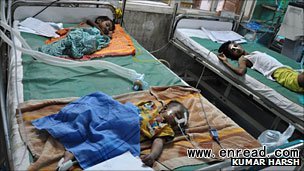印度爆发脑炎 400多人死亡
More than 400 people, mainly children, have died in an outbreak of viral encephalitis in northern India, health officials say.
印度卫生官员称,北部地区有400多人死于病毒性脑炎,大多数死者是儿童。

Viral encephalitis has killed hundreds of children in Uttar Pradesh over the last decade
A doctor told the BBC that it was a "tragedy beyond imagination", with children dying every day.
Nearly 6,000 children have died of encephalitis(脑炎) in the hospital since the first case was detected in 1978.
Most of the deaths this year have happened since July, doctors say.
The disease occurs regularly during the monsoon(季风) in the Gorakhpur region bordering Nepal in the foothills of the Himalayas.
The low-lying areas are prone to floods, providing a breeding ground for mosquitoes which commonly transmit the virus.
'Tragedy'
Doctors say affected patients come from 10-12 districts in the region, and are mostly poor.
Until 2005, the majority of deaths were caused by Japanese encephalitis, caused by a mosquito-borne virus, doctors say.
But in the past six years, children have been dying of other forms of viral encephalitis, the exact cause of which is unclear.
One possibility is a water-borne virus present in contaminated water, doctors say.
The diseases cause head aches and vomiting and can lead to comas, brain dysfunctions, seizures and inflammations of the heart and kidney.
Doctors say children between the age of six months to 15 years are worst affected and most of the victims are poor people from rural areas.
"It is unbelievable tragedy. There are five to 10 children dying every day," Dr KP Kushwaha, head of paediatrics at the BRD Medical College, the only hospital treating patients, told the BBC.
Most of the 370 beds in the paediatrics and medicine departments at the hospital are overflowing with more than one patient to a bed, he said.
A fifth of the children who survive have to live with neurological weaknesses, doctors say.
"Children are most affected because they have lower immunity and they end up consuming a lot of contaminated(受污染的) water at home," Dr Kushwaha said.